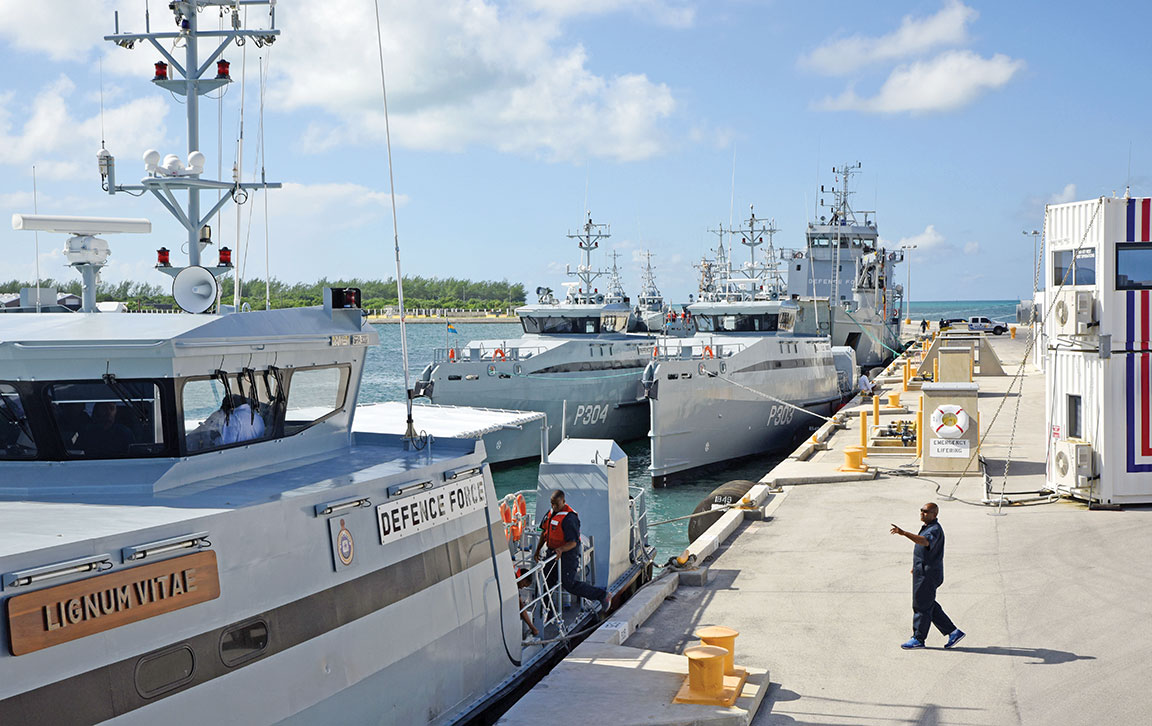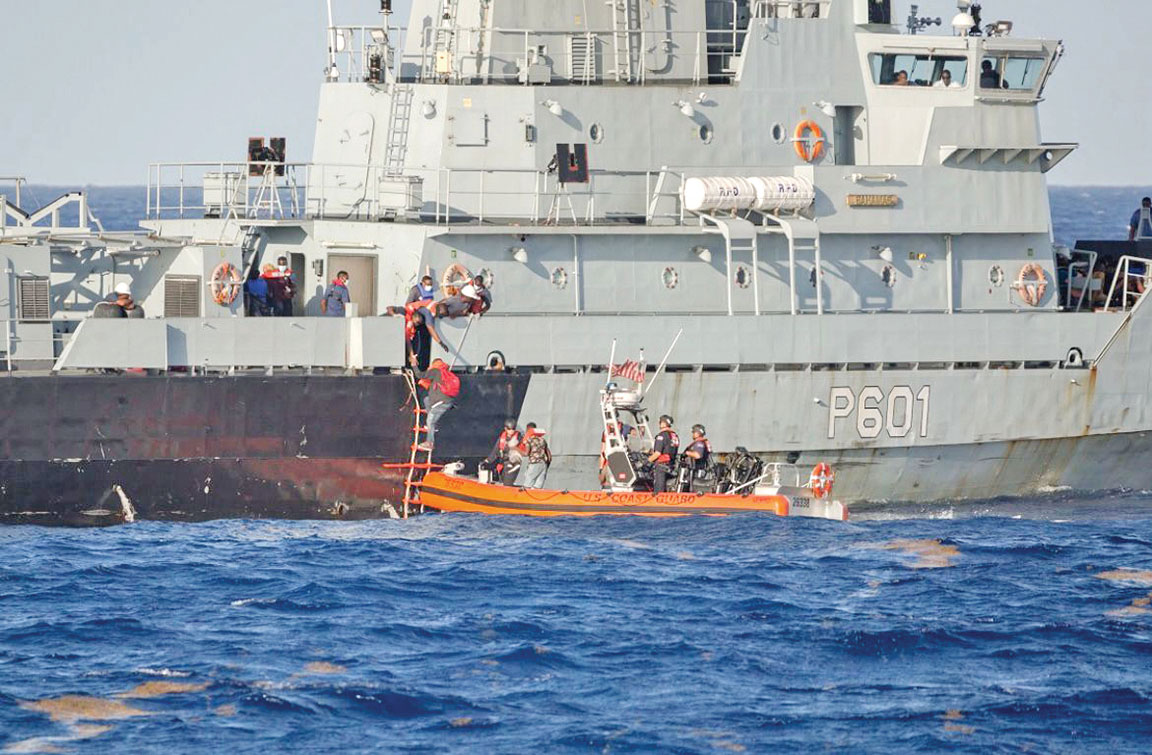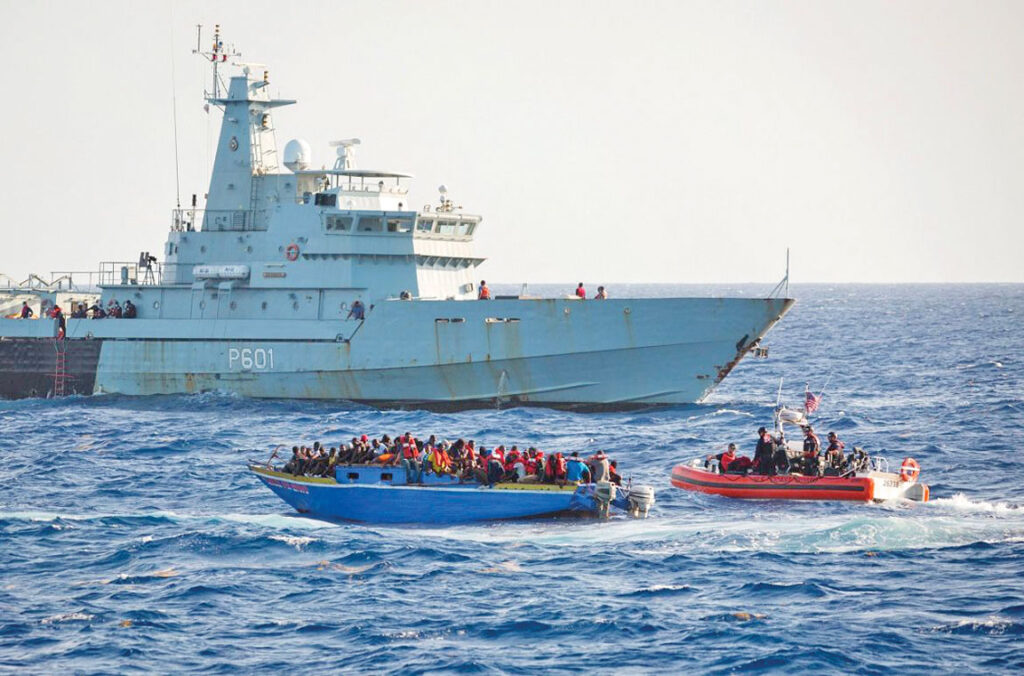A group of 145 Haitian immigrants was intercepted in August 2023 during a joint engagement by Operation Bahamas Turks and Caicos, the U.S. Coast Guard, the Royal Bahamas Defence Force, and officials from the Turks and Caicos Islands. ROYAL BAHAMAS DEFENCE FORCE
COMMODORE Raymond E. KING/ROYAL BAHAMAS DEFENCE FORCE
The Royal Bahamas Defence Force (RBDF), the sole military institution in the Commonwealth of the Bahamas, is tasked with the defense, security and protection of the country’s sovereignty and territorial integrity. The RBDF maintains law and order in conjunction with law enforcement agencies and is responsible for border protection against transnational criminal threats, the provision of humanitarian assistance and disaster relief, and search and rescue operations. Armed with a force of 1,800 members, an airwing branch, and a fleet of ocean, coastal and inshore patrol vessels, the RBDF is proficient in the air, land and sea domains.
The security environment in the Bahamas is volatile, uncertain, complex and dynamic. Because the country straddles the crossroads of the Americas, it regularly confronts complex geopolitical and security issues. Moreover, its vast expanse of islands and cays makes it a potential target for transnational criminal activities, including illegal migration; small arms, light weapons and ammunition smuggling; illegal, unregulated and unreported fishing; and illicit drug trafficking.
These nefarious activities threaten the region’s stability and prosperity and pose significant challenges to global security. Due to the uptick in threats, the RBDF continues to develop and implement robust counterstrategies and proactive measures to address these security challenges and improve its maritime and aerial domain awareness.
The Bahamas is important to U.S. homeland defense due to its strategic objectives such as counterterrorism and counterinsurgencies, cybersecurity and routine border security. Recognized as a critical “third border” buffering the United States along with Canada and Mexico, its security directly affects the U.S. To address these concerns, the RBDF established primary and secondary communications centers that disseminate intelligence to national and regional authorities concerning maritime activities in Bahamian waters.

The RBDF is making noteworthy strides in elevating its maritime domain awareness (MDA) through its robust Maritime Security Strategy, fortified by a meticulous operational approach underscored with an emphasis on intelligence-driven, decentralized and joint maritime interdiction operations. The implementation of the operational architecture has been impressive, notably in the areas of command, control, communications, computers, cybersecurity, intelligence, surveillance and reconnaissance (ISR), and, finally, the Skylight program to collect, process and disseminate maritime domain awareness information. Pioneering the use of coastal radars provided by U.S. Northern Command (USNORTHCOM), the force has expanded its horizon of surveillance. Drone operations and aerial ISR patrols amplify their reach, ensuring persistent and overlapping watch over Bahamian waters. This comprehensive system, integrated with satellite-based communication systems, lets the RBDF maintain a vigilant and modern maritime security apparatus. The RBDF’s maritime domain awareness initiatives and increasing use of satellite-based communications systems are a significant step forward in the force’s efforts to protect the Bahamas from maritime threats.
Security cooperation and regional partnerships are also essential for the Bahamas to protect its security. RBDF collaborates with local and regional entities, leveraging the advantages of mutual compatibility and cooperation. The Bahamas has several existing security arrangements and memoranda of understanding with other countries and organizations. These include the Caribbean Community Market Access System, the Implementation Agency for Crime and Security, the Regional Intelligence Fusion Centre, the Regional Security System, the Joint Regional Communications Centre, Operation Bahamas, Turks and Caicos, Canada’s Department of Fisheries and Oceans, the Bahamas-U.S. Mutual Defense Agreement, the U.S.-Caribbean 3P Initiative (Partnership, Prosperity, and Peace), Turks and Caicos Islands Regiment and Police Force, Guyana Defence Force’s shiprider programs, and Bahamas-U.K. Defense Cooperation Agreement.
These arrangements provide a framework for cooperation on security issues, including maritime security, drug trafficking and terrorism. The Bahamas also participates in intelligence- and information-sharing networks, such as the Caribbean Counter-Terrorism Cooperation Network, Regional Information Management System, Caribbean Law Enforcement and Security Cooperation Network, National Counterterrorism Center, and the United Kingdom National Counter Terrorism Security Office. By fostering these ties, the RBDF elevates its security capabilities and contributes to a cohesive, collective defense strategy for the entire region.

The Bilateral Security Cooperation Framework between USNORTHCOM and the RBDF exemplifies a robust partnership fostering regional stability and both nations’ defense. This strategic alignment strengthens the RBDF’s capability and capacity with a focus on discrete lines of efforts, namely maritime domain awareness to enhance the organization’s intelligence, communications and cybersecurity capabilities; maritime domain control to strengthen the entity’s all-weather terrain detection capabilities, decentralized operations and search and rescue capability; and institutional capacity building to ensure a capability-based force structure with professional members to maximize operational efficiencies and mission effectiveness.
Moreover, the relations between the RBDF and entities like USNORTHCOM, U.S. Southern Command, Special Operations Command North, Rhode Island National Guard and the U.S. Coast Guard deepen this commitment, collectively enhancing regional security and cooperation against threats in the maritime and aerial domains.
The RBDF has demonstrated its commitment to enhance its maritime domain awareness and countering transnational criminal networks. The RBDF is undertaking several initiatives to achieve this goal, including the Sandy Bottom Project, which targets harbor dredging and the development of docks and quay walls across the Bahamas, enhancing its bases, and operation of its fleet and aircraft. Alongside upgrading existing vessels, the RBDF is procuring new patrol boats and aircraft to fortify the security of Bahamian waters. The project also underlines a strategic decentralization of air, land and sea operations to ensure prompt threat responses.
Similarly, significant investments in drones and unmanned vehicles and establishing a drone academy have boosted maritime surveillance capabilities. Collaborative endeavors, like the three-year service agreement with Damen Shipyards, will train personnel in vessel maintenance, establish a system for maintenance management, offer technical guidance, and create a logistics framework that aids in inventory management, further solidifying the Bahamas’ resolve in these arenas.
Security cooperation partnerships are essential for the safety and security of the Bahamas and the United States. By working together, the two countries can leverage their strengths and resources as force multipliers in mutually beneficial ways to address common security threats. Such security partnerships afford several benefits, including increased maritime domain awareness, enhanced capacity building, enhanced cooperation on intelligence sharing and disaster relief.
The Bahamas and the U.S. have a long history of security cooperation. By continuing to work together, the two countries can build on this foundation to enhance their security and ensure the defense, security, peace and safety that both countries envision.

